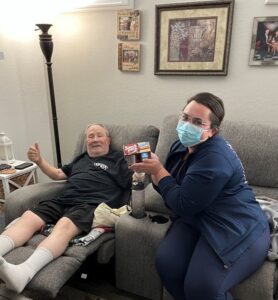“It actively supports and encourages independence.”
While many of us require more help as we age, maintaining a degree of independence is important. Perry and his wife Cheryl have found this balance living in a home that is connected to their children’s. Following Perry’s recent admission to the hospital, the independence that Contessa’s Recovery Care at Home program supported by bringing him home to continue receiving hospital-level care was all the more appreciated.
A sudden change in health

Cheryl shared that in September of 2022, Perry had experienced a mild stroke. So, in late January, when he suddenly started experiencing symptoms of confusion and weakness one morning, she was immediately concerned that he was having another stroke. “He was not himself,” she says. “He was dramatically shaking.” When she asked him what was wrong, Cheryl says Perry responded that he was cold. “But it wasn’t that cold,” she says. “I’m thinking, ‘what am I dealing with here?’” She remembers that he wouldn’t follow directions, “but he didn’t show true stroke symptoms, either.”
That’s when Cheryl called her daughter-in-law over to help. “He wasn’t really responsive,” she says. Together they tried to move him from the bed, but Perry wasn’t able to follow directions. Concerned, Cheryl called 911.
The paramedics who arrived agreed that Perry needed to be evaluated at the hospital. “We got to the hospital,” Cheryl recalls, “and they said he’s got a UTI and he’s actually going into sepsis.”
Sepsis, the body’s extreme reaction to an infection, is a life-threatening emergency. “When we got him to the hospital, his temperature was 100.4. They put him on antibiotics immediately and that afternoon his temperature was 103,” Cheryl says. “We literally caught it right at the crucial moment.”
Thankfully, the quick intervention and treatment at the hospital turned Perry’s condition around. As he began to improve, Cheryl says she was approached about the Recovery Care at Home program. “They said, ‘Would you be interested in a home care where he would still be under hospital care, but he would be allowed to go home and have nurses check on him?’ And I looked and him and he looked at me, and I said yes,” she says enthusiastically. “We were very interested in that.”
Cheryl explains that the reason they were so interested is because Perry always does better in their own home than when he’s in the hospital. “He eats better, he tends to be more active, he doesn’t like to be nailed to the bed. You know, it’s just home.”
She continued, “It actively supports and encourages independence. As long as you have people who can help with that, everybody benefits.”
As part of his stay in the Recovery Care at Home program, Perry received twice daily nursing visits, intravenous (IV) fluids and antibiotics and physical therapy (PT) and occupational therapy (OT) to improve his ability to be independent. He was also set up with all the equipment needed for his care, including a tablet for virtual visits with a physician.
“The way everything was handled was about as smooth and stress free as it gets,” Cheryl says.
The little things go a long way
One of the best things about the program, Cheryl says, is the level of care and attention the nurses offered. “What I see is the analytic process going on. When they come in the house, they’re doing an evaluation of the living situation. But they do it very sensitively,” she noted. “I felt they came in and they determined this was appropriate for him and he could handle it.”
She adds, “The nurses really made a personal connection with him. They succeeded on every level, they had the knowledge, and they were able to make the emotional connection.”
Vacation plans within reach
That extra connection and support soon had Perry doing laps around the house to build back up his strength. “He started off doing 10-20 laps a day around the house,” Cheryl says. “Yesterday, he did 70 laps. We are planning a vacation and I said ‘you need to be able to walk, because we’re going to do a lot of walking.’
“I think he’s going to be able to do it.”
Cheryl says, “I would highly recommend it to anyone who is offered it, because I feel they would have a more rapid recovery rate overall, and it frees up beds in the hospital. That seems like a real advantage. We really appreciated it, and it worked out really well for us.”
